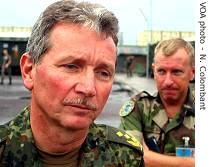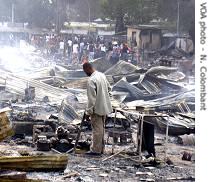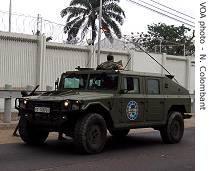Colombant report - Download 332k
European rapid reaction force commanders in the Democratic Republic of Congo say they believe the second-round presidential run-off Sunday will have a much more peaceful outcome than the first round, when results were followed by deadly clashes in the capital.
![]()
Listen to Colombant report
![]()
The commander of the force, known as EUFOR, General Karl Heinz Viereck, says his forces, currently numbering about 800 in Kinshasa, and 1,200 positioned in nearby Gabon, are better prepared for any major violence.

General Karl Heinz Viereck
"I am very positive, insofar as that we do not [make] the same failures again like we did the last time here," said General Viereck. "So, I hope everybody got the experience from last time, and [will] take that into account when we go for the second round of the election. I would not like to speculate what we are going to do. What I will say is, we do [have] the required operation, but after analyzing the situation very carefully."
 |
| Violence Has Marked Campaign Period in the DRC |
EUFOR was criticized by Congolese media for not doing enough to help the overstretched U.N peacekeeping force.
But General Viereck disputed speculation that EUFOR's role was merely to protect, and eventually evacuate Europeans.
"We are not here for evacuation," he said. "We are here to support the election campaign, and everything points to that we get a successful election. We do our utmost to assure the people here that they have a good chance to go for that date and really get their voice heard. That is what we are here for."
 |
| EUFOR troops patrolling Kinshasa |
The force's tactical commander General Christian Damay said the crash was an accident.
"We took all the necessary measures to correct this," said General Damay. "Now, the drones are flying. Yesterday, we had a flight with all the authorization from the Congolese authorities. So, it is okay now for the drones."
Campaigning for Sunday's vote has been marked by very few appearances from the two candidates, and recurrent skirmishes between rival supporters.
Bemba, a former rebel leader who got 20 percent in the first round, is popular among many people in Kinshasa and other western areas . These include many who have boycotted the election process.
Mr. Kabila first became president when his father, former coup leader Laurent Desire Kabila was assassinated. During the first round, he won almost all votes in the east. Since then, he has allied himself with the western-based third and fourth place first-round finishers.
The mineral-rich Congo has had a brutal history, marked by the plundering of its resources, benefiting corrupt leaders and foreign businessmen, all the while accentuating local social hardship.
Related articles
- • Felix Tshisekedi Sworn In as DR Congo President (January 24, 2019)
- • Constitutional Court Declares Tshisekedi Winner of Presidential Election (January 19, 2019)
- • Felix Tshisekedi Vows to Be the President of All Congolese (January 10, 2019)
- • Felix Tshisekedi Elected DR Congo President (January 10, 2019)
- • DR Congo Delays Results of December Election (January 6, 2019)
- • Botswana Urges Joseph Kabila to Step Down (February 26, 2018)
- • No elections in DR Congo in December without electronic voting machines: INEC (February 13, 2018)
- • US Warns DR Congo Against Electronic Voting for Delayed Election (February 12, 2018)
- • Felix Tshisekedi accuses INEC of illegally prolonging Kabila's mandate (October 24, 2017)
- • DRC Seeks Arrest of Presidential Candidate Moise Katumbi (May 19, 2016)
- • Papa Wemba Is Buried in Kinshasa (May 4, 2016)
- • Papa Wemba Awarded Highest National Honor as Thousands Pay Tribute (May 2, 2016)
- • Rights Groups: DR Congo Must Free Pro-democracy Activists (April 13, 2015)
- • Police Open Fire on Crowd Protesting Election Law Change (January 19, 2015)
- • Etienne Tshisekedi Evacuated to Belgium for Medical Treatment (August 16, 2014)
- • Kerry Calls on Kabila to Honor Constitution (May 4, 2014)
- • Kerry in DR Congo for Security Talks (May 3, 2014)
- • DR Congo Takes Chairmanship of COMESA at Summit in Kinshasa (February 26, 2014)
- • DR Congo Honors Nelson Mandela, Hero and Model for Humanity (December 6, 2013)
- • Kabila Congratulates Congo Army for Defeating M23 Rebels (October 30, 2013)
- • DR Congo Eases Process for Starting a New Business (June 3, 2013)
- • Regional Leaders Sign DR Congo Peace Deal (February 24, 2013)
- • The M23 Rebels Want to Overthrow Kabila? Nonsense (November 28, 2012)
- • Protests Against M23 Rebels, Government and UN Spread (November 22, 2012)
- • Thousands Protest M23 Capture of Goma, Turn on Government and UN (November 21, 2012)
- • DR Congo Officials Vow to Defend Goma Against M23 Rebels (November 19, 2012)
- • At high-level meeting, Ban urges political solution to crisis in eastern DR Congo (September 27, 2012)
- • US Cuts Military Aid to Rwanda Over Support to Rebels in DR Congo (July 21, 2012)
- • DR Congo, Rwanda Sign Pact to Fight Rebels in Eastern Congo (July 15, 2012)
- • Police Investigate Former Prime Minister for Corruption (May 14, 2012)







